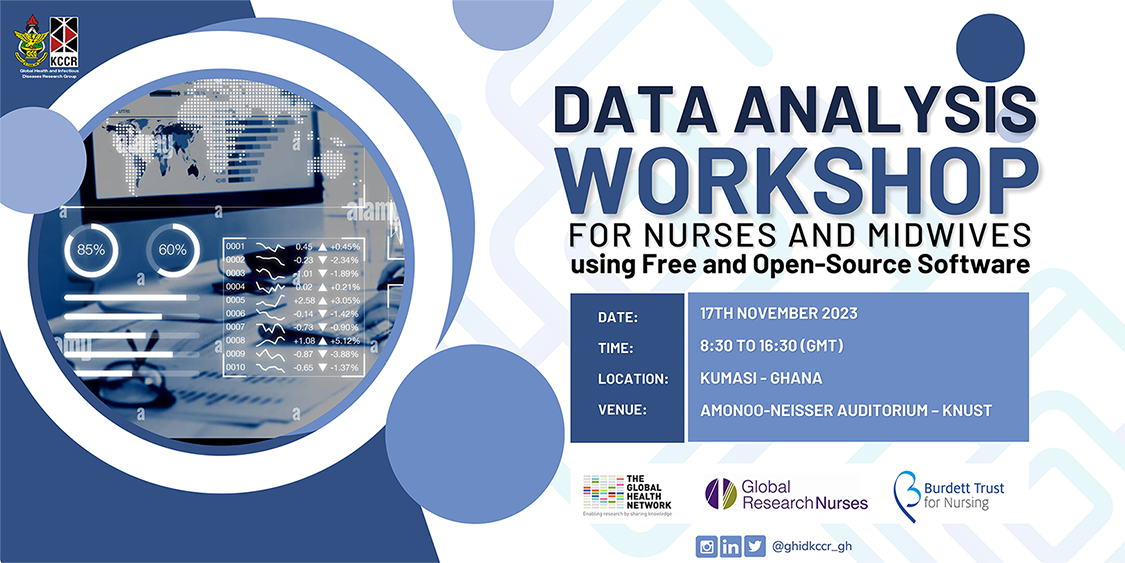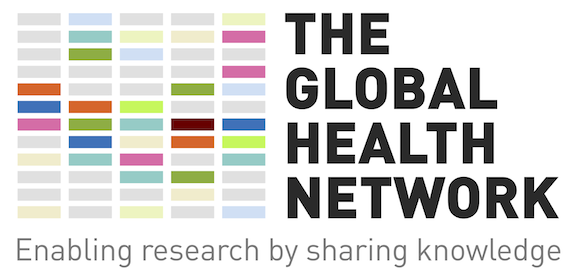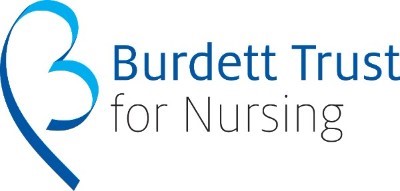1-day workshop on data analysis for nurses and midwives in Health Training Institutions in Ghana using free and open-source software
17 Nov 2023

Location: Amonoo-Neisser Auditorium – Kwame Nkrumah University of Science and Technology, Kumasi, Ghana
Language: English
Number of Participants: 35 (in-person)
Institutional affiliation: Kumasi Center for Collaborative Research into Tropical Medicine
Evidence-based practice is increasingly vital in Low- and Middle-Income Countries (LMICs), including Ghana, especially in light of the ongoing challenges and the recent impact of the COVID-19 pandemic. Nurses and midwives, as frontline healthcare providers, play a crucial role in patient care and must enhance their data analysis skills to optimize patient outcomes. Unfortunately, access to training in data analysis remains limited. To address this gap, it is imperative to organize workshops that empower these healthcare professionals with the necessary tools and techniques to effectively analyze data and apply it to improve patient care.
We are excited to announce an upcoming 1-day workshop, open for applications, that will be available to a select group of 35 attendees from across the country. This workshop aims to introduce participants to the fundamental principles of data analysis, with a specific focus on tabulation and data visualization. The goal is to equip attendees with the skills needed to interpret and communicate the results of statistical analyses, ultimately promoting evidence-based practice in healthcare.
During the workshop, participants will have the opportunity to work with a provided dataset, allowing them to apply the concepts and techniques they learn in a practical setting. Using JASP, a free and open-source software for data analysis, participants will explore and visualize data, tabulate frequencies and trends, calculate measures of central tendency, and create data visualizations such as histograms and bar plots. The workshop will emphasize not only data analysis but also the interpretation of findings.
Led by experienced trainers in healthcare research and data analysis, the workshop will prioritize hands-on, practical training to ensure that participants gain relevant skills and knowledge. Additionally, this workshop will foster networking opportunities, enabling participants to connect with peers and explore avenues for collaboration and professional growth.
By participating in this workshop, mid-career nurses and midwives will acquire the expertise needed to effectively communicate research results to their colleagues and healthcare facilities. These newfound skills will empower them to inform evidence-based practice, enhancing patient care and healthcare outcomes.
We encourage all eligible healthcare professionals to apply and take advantage of this valuable opportunity to enhance their data analysis skills and contribute to evidence-based healthcare in Ghana. Stay tuned for further details on the application process and workshop dates. Together, we can make a positive impact on patient care and healthcare practices in our region.
Workshop objectives:
By the end of the workshop, the nurses/midwives will be able to:
- Perform data exploration through tables and graphs to identify trends and patterns.
- Interpret results from the descriptive analysis.
- Communicate and collaborate on data analysis reports to inform patient care decisions.
- Generate reproducible and reusable reports that can be used in evidence-based practice.
To participate in the workshop, attendees are required to bring their own laptop and install Jamovi software. You can download the software from the following link: Jamovi Desktop. Please ensure you download the SOLID version.
AGENDA – 17th November 2023
| Time | Talk | Panellists |
| 8:30 – 8:40 | Registration | Facilitation team from TGHN-GRN |
| 8:40 – 8:50 | Welcome address | Kwaku Duah I. (Facilitator) |
| 8:50 – 9:00 | Introduction to THGN - GRN | GHID team |
| 9:00 – 9:15 | Introduction to data analysis
|
Robert A. (Facilitator) |
| 9:15 – 9:30 | JASP interface | Robert I. |
| 9:30 – 10:00 | Importing data into JASP
|
Kwaku Duah I. |
| 10:00 – 10:10 | COFFEE BREAK | |
| 10:10 – 10:15 | Extracting point estimates
|
Melvin A. (Facilitator) |
| 10:15 – 10:30 | Tabulation
|
|
| 10:30 – 11:05 | Visualization
|
Kwaku Duah I. |
| 11:05 – 11:15 | SNACK BREAK | |
| 11:15 – 12:15 | Analysis interpretation for graphs and tables | Melvin A. (Facilitator) |
| 12:15 – 12:45 | Combining outputs and generating reproducible reports | Kwaku Duah I. |
| 12:45 – 13:00 | Collaborate and share reports and projects | Robert A. |
| 13:00 – 14:00 | LUNCH BREAK | |
| 14:00 – 15:00 | Group work | Robert A., Kwaku Duah I., Melvin A. |
| 15:00 – 15:50 | Group Presentation and awards | |
| 15:50 – 16:10 | Closing remarks
|
|
| 16:10 – 16:30 | Networking and photography
|
|
Profiles
Robert Asampong
Robert Asampong is a Research Fellow at the Global Health and Infectious Diseases Research Group (Kumasi Centre for Collaborative Research in Tropical Medicine) where his main duties involve data analysis and modeling using statistical software such as R, STATA, and JASP. He holds a Master of Philosophy degree in Field Epidemiology and Applied Biostatistics from the Kwame Nkrumah University of Science and Technology and a Bachelor’s degree in Public Health (Disease Control) from the University of Health and Allied Sciences. Robert is passionate about biostatistics and helping public health and clinical scientists to understand, analyze, interpret, and communicate biomedical data.
Duah Kwaku Ibrahim
Kwaku Duah is a Senior Nursing Tutor with the Ministry of Health, Ghana, and the Data manager/Nurse with the Global Health and Infectious Disease Group (GHID) at the Kumasi Center for Kumasi Centre for Collaborative Research in Tropical Medicine in KNUST. Duah holds a Master of Philosophy in Public Health with a specialization in Health Research and Management from the Kwame Nkrumah University of Science and Technology, Ghana. Mr. Duah is a self-taught computer programmer with competency in many programming languages, including Microsoft C# and R Statistical Language and JavaScript. He frequently organizes workshops for students within GHID on data management and analysis and organizes professional engagements with the Registered Community Health Nurses Group in Ghana. His research interests are snakebites, chronic diseases, and data modelling.
Melvin Agbobatey
Dr. Melvin Agbogbatey is a research fellow with the Global Health and Infectious Diseases Research Group at the Kumasi Centre for Collaborative Research in Tropical Medicine. He is a qualified medical doctor and a former WHO-TDR fellow in implementation research who has been involved in research, policy, and advocacy with several organizations and consortia including the WHO, The Lancet One Health Commission, UNAIDS, The Africa Coalition for Epidemic Research Response and Training, the Global Health Network, The International Society for Acute Respiratory and Emerging Infections Consortium, and Africa CDC. Melvin's current areas of focus include clinical trials of COVID-19 vaccines, epidemiological studies of re-emerging infectious diseases, implementation research on mHealth interventions, and clinical characterization of snakebite envenoming in Ghana.



